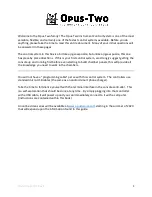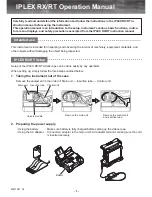
User manual - METER SWE-73-L
6.3.1.
One threshold mode
Figure 6.5 presents the principle of relay outputs operation for one threshold mode, and
an example values of other parameters.
Description:
A, B, C, D
- points where measured signal exceeds border values (expected value ± allowed deviation)
tA , tB , tC , tD
- time periods while input signal is in zone A or zone B
Figure 6.5.
Principle of LED/relay output operation for one threshold mode
Parameter
“SEtP”
sets a
threshold
of the relay, and parameter
“HYSt”
sets
a
hysteresis
of the relay (figure 6.5 a). The relay can change his state
only
when input value
exceeds (over or under)
border value
.
Border values
means values equal
threshold
+
hysteresis
and
threshold
-
hysteresis
respectively.
The relay state will be changed
as soon
as input value exceeds any of the
border values
(see points A and C, figure 6.5 a, b, c)
but only if
at least 4 seconds elapsed
since last change of the relay state, in the other case relay state will be changed after required
delay (4 sec).
The state of relay output while the input value exceeds the
border values
(points A, B, C,
D) is described by parameter
“modE”.
The relay can be turned on (
“modE”
=
“on”
), or
turned off (
“modE”
=
“oFF”
) when input signal value enters the
zone A
(figure 6.5 a).
The parameter
“AL”
allow user to set the relay output behaviour in critical situations (e.
g. Input values exceeds
permissible measurement range
)
.
User can select that the relays
will be turned on, turned off,or not changed in critical situations.
All parameters connected with relay outputs are described in paragraph
“
rEL” menu
.
15
“SEtP”
parameter
(expected signal value)
“HYSt”
parameter
(allowed signal
deviation)
measured
signal
displayed value
time
time
A
B
C
D
relay state
(
modE
=
on
)
t
A
t
B
t
C
t
D
B
ON
D
OFF
relay state
(
modE
=
oFF
)
B
OFF
D
ON
time
closed
open
a)
b)
c)
open
closed
zone A
zone B
















































